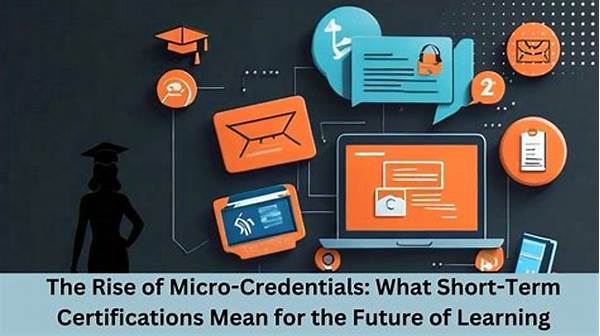The Rise of Micro-Certifications in Global Learning
Read More : Tambakbet Covers Courses Culminating In Public Portfolios
In today’s rapidly evolving job market, traditional degrees are no longer the only pathway to career advancement and success. Enter micro-certifications—an innovative form of skills validation that is rapidly gaining traction across industries worldwide. With a focus on agility and specificity, micro-certifications are transforming the educational landscape by offering learners the ability to gain targeted skills in a fraction of the time and cost. It’s the rise of micro-certifications in global learning, and it’s taking the educational world by storm.
Micro-certifications, often facilitated through online learning platforms, have become the trendy new accessory for resumes. Why? Because they offer what traditional degrees often cannot—specificity and immediacy. Imagine being able to upskill in social media marketing, data analysis, or project management in a matter of weeks, all from the comfort of your home. These certifications are designed to be laser-focused, making them highly relevant to today’s ever-changing job market. As industries continue to evolve, the need for adaptability is more paramount than ever. Businesses are increasingly valuing these certifications as legitimate proof of expertise, often giving a nod of approval over conventional educational qualifications.
Gone are the days when you needed a four-year degree to step foot in the competitive corporate world. With the rise of micro-certifications in global learning, the playing field is leveling. Small, credible, and economically viable, micro-certifications serve as mini-degrees, allowing learners to build a diverse skill set over time. They’re like Pokémon but for skills—you gotta catch ’em all to stay ahead in the game!
What Drives the Rise of Micro-Certifications?
The adaptability and practicality of micro-certifications aren’t just buzzwords—they are the driving force behind the widespread adoption of this educational model. Learning today needs to be quicker, cheaper, and more flexible to keep up with the pace of industry changes. By focusing on practical, skill-based learning, micro-certifications allow learners to immediately apply their new skills in the work environment, thereby enhancing their job performance and career opportunities. It’s a win-win for both employers and employees, and a compelling factor behind the shift towards micro-certifications in global learning.
—
Introduction to the Rise of Micro-Certifications in Global Learning
Micro-certifications have gained a foothold in the educational sector not just as an alternative, but as a revolutionary way of learning. Imagine you’re a seasoned marketer who’s keen on venturing into digital analytics. Traditionally, you’d consider going back to school or attending a year-long course, but with micro-certifications, you can access condensed, intense learning modules specifically tailored to hone the skills you need. This emerging trend of the rise of micro-certifications in global learning is speaking directly to professionals who require skill enhancements in record time.
Being a skeptical consumer is almost second nature to us these days. Before committing your hard-earned money, you scour reviews, compare alternatives, and check references. When it comes to education, it should be no different. Micro-certifications offer a solution by providing bite-sized pieces of wisdom that are to the point and deliver key learnings much faster than conventional degree programs.
The global learning environment is increasingly veering towards personalization, and micro-certifications are at the heart of it. As the world becomes more interconnected, the flexibility that comes with these options allows individuals from different backgrounds and locations to access the same quality education, demolishing geographical and financial barriers that previously existed.
The popularity of micro-certifications doesn’t just stem from their flexibility, but also from their widespread recognition. Top-tier companies like Google, IBM, and Microsoft have embraced them, offering their programs as a testament to the growing acceptability and credibility of these digital badges.
It’s high time to put the spotlight on the unsung hero of modern education—the micro-certification. With employers and learners alike praising its streamlined, practical approach, it’s crystal clear that this form of learning isn’t just a passing trend; it’s the future. Experiences from users around the globe highlight how these certifications have boosted their careers, increased their earning potential, and even opened up new avenues they never thought possible. The rise of micro-certifications in global learning is here to stay, and it’s reshaping how we think about both skill acquisition and education at large.
—
Discussions on the Rise of Micro-Certifications in Global Learning
As the demand for micro-certifications continues to gain momentum, discussions around their value in the employment landscape have become paramount. Many employers today recognize these certificates as legitimate markers of expertise. In fact, the rise of micro-certifications in global learning corresponds with an increase in specialized job roles that require niche skills acquired through these certifications.
Cost efficiency plays a crucial role in their appeal. For both learners and institutions offering these certificates, the financial and time investments are significantly lower than traditional learning models. This is an attractive proposition for many, especially for those who need to juggle work, family, and education.
The convenience factor cannot be overstated. With learning modules often available online, micro-certifications break down barriers, allowing global students to learn at their own pace and according to their schedules. This level of accessibility ensures that geographical limitations or time zone differences are not a hindrance in the pursuit of education.
While there’s no denying that traditional education holds its value, micro-certifications cater to immediate professional needs. Given the rapid pace of technological advancements and market evolution, these certifications equip learners with the up-to-date skills necessary to bridge gaps and meet current demands, a key reason for the rapid rise of micro-certifications in global learning.
—
The Rise of Micro-Certifications: A Deep Dive
In an ever-evolving world, education systems must adapt or risk becoming obsolete. Enter micro-certifications, the 21st-century study method for fast-paced learners eager to stay ahead. Unlike conventional degrees, which might seem more like a shotgun approach, micro-certifications offer a sniper’s precision, gearing learners up with the exact skills they need.
Shifting consumer expectations and technological advancements are the true culprits behind the rise of micro-certifications in global learning. People want quick solutions, value for their investment, and immediate results—and micro-certifications deliver this trifecta. Individuals are keen to prove their worth in the job market swiftly and efficiently, and these small but mighty certificates serve as effective calling cards.
Furthermore, micro-certifications have become the darling of corporations that are looking to upskill their workforce without breaking the bank. Companies recognized the value of a well-equipped team, and micro-certifications enable this in a scalable, cost-effective manner.
The stories from those who’ve revamped their careers through micro-certifications also play a vital role in their ascent. It’s not just about acquiring a certificate, it’s about transformative educational journeys that render traditional learning routes inadequate by comparison. The rise of micro-certifications in global learning is redefining success paradigms and reshaping futures.
Industry Perspective on Micro-Certifications
The industry buzz around micro-certifications has turned into a full-fledged clamor. Organizations are now seeing these mini-degrees as effective tools for tooling-up their workforce. Many companies have started partnering with educational platforms to design tailor-made programs, reinforcing their faith in micro-certifications to produce work-ready talent.
As the workplace becomes increasingly digital, there’s an urgent need for skills such as coding, digital marketing, and analytics, which aren’t always part of traditional educational curricula. This is where micro-certifications, which specialize in modern, in-demand skills, shine the most.
So, whether you’re an employer looking to bridge skill gaps within your team, or a lifelong learner seeking continuous growth, the rise of micro-certifications in global learning offers tangible opportunities for everyone. Embrace this educational shift—your future self will thank you.
—
Brief Explanations on the Rise of Micro-Certifications
The rise of micro-certifications in global learning is reshaping how we perceive, acquire, and validate skills across industries. Here are some key points about this burgeoning trend:
Educators and employers worldwide are starting to see the undeniable benefits of integrating micro-certifications into the wider educational framework. These certifications offer unparalleled flexibility, allowing learners to study at their own pace without the constraints of a traditional classroom setting. This adaptability makes them particularly attractive for busy professionals and international learners.
Cost is no longer a prohibitive factor when it comes to gaining new skills. Micro-certifications are significantly cheaper than degree programs, making them a viable option for those on a budget. The economic downsides of student debt are well-known, making these efficient and budget-friendly certifications a welcome alternative.
Recognition from leading industry employers is another significant advantage. Many companies now understand that these focused, skill-specific certifications can be a reliable indicator of a candidate’s aptitude and expertise.
Micro-certifications are typically shorter in duration, requiring less time to complete than regular degree programs. This brief time commitment enables learners to quickly adapt to new roles or responsibilities, often with tangible career benefits.
The seismic shift towards the digitization of education plays a crucial role in the format and delivery of these programs. Innovative digital platforms host comprehensive learning experiences that are interactive, engaging, and suitable for the contemporary digital-native learner. The rise of micro-certifications in global learning is not just an educational trend; it’s a revolution in how learning adapts to meet the evolving needs of the modern world.
—
I hope you find this content engaging and aligned with your style requirements. Let me know if there’s anything more specific you would like to include!


